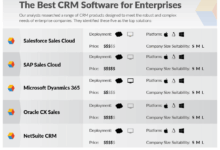CRM with AI Chatbot Integration
CRM with AI Chatbot Integration represents a significant advancement in customer relationship management. This powerful combination leverages the efficiency of CRM systems with the intelligent capabilities of AI-powered chatbots, creating a streamlined and personalized customer experience. By automating routine tasks, providing instant support, and offering personalized interactions, AI chatbots transform how businesses engage with their customers, leading to improved customer satisfaction, increased sales, and enhanced operational efficiency. This exploration will delve into the benefits, implementation, challenges, and future trends of this innovative technology.
We will examine how AI chatbots enhance core CRM functions, analyze successful implementations across various industries, and address crucial considerations such as security and data privacy. The integration of AI chatbots is not merely an add-on; it fundamentally reshapes the CRM landscape, allowing businesses to build stronger relationships, improve customer loyalty, and ultimately drive greater success.
Defining CRM with AI Chatbot Integration
A Customer Relationship Management (CRM) system is a software solution designed to manage and analyze customer interactions and data throughout the customer lifecycle. Its core functionality involves organizing customer information, tracking interactions, automating tasks, and improving business relationships. Integrating an AI-powered chatbot significantly enhances these capabilities, creating a more efficient and customer-centric experience.
AI chatbot integration elevates CRM functionality in several key ways. The chatbot acts as a virtual assistant, handling routine inquiries, providing instant support, and qualifying leads. This frees up human agents to focus on more complex tasks and high-value interactions. Furthermore, AI chatbots can analyze customer data to personalize interactions, predict customer behavior, and proactively address potential issues. This leads to improved customer satisfaction, increased sales conversions, and a deeper understanding of the customer base.
Examples of Successful CRM-Chatbot Integrations
Several industries have successfully integrated AI chatbots into their CRM systems. In e-commerce, companies like Sephora use chatbots to answer product questions, provide order tracking information, and guide customers through the purchasing process. In the financial services sector, banks employ chatbots to handle account inquiries, provide balance information, and assist with simple transactions. Healthcare providers utilize chatbots to schedule appointments, send appointment reminders, and answer basic medical questions. These examples demonstrate the versatility and effectiveness of this integration across diverse sectors.
| Feature | Traditional CRM | AI-Powered CRM | Advantages of AI Integration |
|---|---|---|---|
| Lead Qualification | Manual process, often time-consuming and prone to errors. | Automated lead scoring and qualification based on AI-driven analysis of customer data. | Faster lead qualification, improved lead prioritization, increased sales conversion rates. |
| Customer Service | Relies heavily on human agents, potentially leading to long wait times and inconsistent service. | Provides 24/7 instant support through AI chatbots, handling routine inquiries and freeing up human agents for complex issues. | Improved customer satisfaction, reduced wait times, increased efficiency. |
| Sales Forecasting | Based on historical data and manual analysis, often lacking accuracy and predictive capabilities. | Utilizes machine learning algorithms to analyze vast amounts of data and predict future sales trends with greater accuracy. | Improved sales planning, better inventory management, optimized resource allocation. |
| Personalized Interactions | Limited personalization, often relying on basic segmentation. | Offers highly personalized experiences based on AI-driven analysis of individual customer preferences and behavior. | Increased customer engagement, improved brand loyalty, higher customer lifetime value. |
Benefits and Use Cases
Integrating AI chatbots into your CRM system offers a wealth of advantages, significantly enhancing customer service, streamlining sales processes, and ultimately boosting your bottom line. This integration allows businesses to leverage the power of automation while maintaining a personalized and efficient approach to customer interaction.
Improved customer service is achieved through instant responses, 24/7 availability, and consistent service quality. This frees up human agents to focus on more complex issues, increasing overall team efficiency and customer satisfaction.
Improved Customer Service
AI chatbots provide immediate responses to common customer inquiries, resolving issues quickly and efficiently. This reduces wait times, leading to increased customer satisfaction and loyalty. The consistent, accurate information delivered by the chatbot ensures a uniform and high-quality service experience, regardless of the agent or time of day. Furthermore, chatbots can handle multiple customer interactions simultaneously, maximizing resource utilization. For example, a retail company might use a chatbot to answer questions about shipping times, return policies, and order tracking, freeing up human agents to handle more complex issues such as product defects or damaged shipments.
Impact on Lead Generation and Sales Conversion Rates
AI chatbots can significantly improve lead generation and sales conversion rates. By proactively engaging website visitors and qualifying leads, chatbots can identify potential customers and guide them through the sales funnel. They can collect crucial information such as contact details and preferences, enriching the CRM database with valuable lead data. Moreover, chatbots can nurture leads by providing relevant information and resources, increasing the likelihood of conversion. A B2B software company, for instance, might use a chatbot to qualify leads based on company size and industry, routing high-potential leads to sales representatives while providing self-service resources to less qualified prospects. This automated lead qualification and nurturing process can significantly increase sales efficiency.
Personalized Customer Interactions
AI chatbots personalize customer interactions by leveraging data stored within the CRM system. They can access customer history, purchase behavior, and preferences to provide tailored responses and recommendations. This personalized approach fosters stronger customer relationships and increases engagement. For example, an e-commerce platform might use a chatbot to recommend products based on a customer’s past purchases or browsing history, or offer personalized discounts and promotions. This level of personalization creates a more engaging and valuable customer experience.
Case Study: Acme Corporation
Acme Corporation, a mid-sized e-commerce business selling handcrafted jewelry, implemented an AI chatbot integrated with their CRM. Before the integration, their customer service team struggled to handle the high volume of inquiries, leading to long wait times and frustrated customers. After implementing the chatbot, Acme saw a 30% reduction in customer service response times and a 15% increase in customer satisfaction scores. The chatbot handled over 70% of common inquiries, freeing up human agents to focus on complex issues and proactively engage with high-value customers. Furthermore, the chatbot’s lead qualification capabilities resulted in a 10% increase in sales conversion rates within the first quarter of implementation. This successful integration demonstrated the significant impact AI chatbots can have on improving efficiency, customer satisfaction, and ultimately, revenue.
Implementation and Integration Challenges
Integrating AI chatbots with existing CRM systems presents a unique set of hurdles, demanding careful planning and execution. Successful integration requires a deep understanding of both the CRM’s architecture and the chatbot’s capabilities, along with a strategic approach to address potential compatibility issues and data flow complexities. Overcoming these challenges is crucial for maximizing the benefits of this powerful combination.
Several key areas contribute to the complexity of integrating AI chatbots with CRM systems. These include data synchronization, API compatibility, security concerns, and the need for robust error handling and monitoring. Technical considerations are paramount, encompassing the choice of integration method, the management of user authentication, and the design of seamless handoffs between the chatbot and human agents.
Technical Considerations for Seamless Integration
Seamless integration necessitates careful consideration of several technical aspects. Data synchronization between the chatbot and the CRM is crucial for maintaining data consistency and accuracy. This requires establishing a reliable and efficient data exchange mechanism, often involving APIs. The chatbot’s API must be compatible with the CRM’s API, requiring potential custom development or the use of intermediary integration platforms. Security is another paramount concern; the integration must protect sensitive customer data through robust authentication and authorization protocols. Finally, a robust error handling and monitoring system is vital for identifying and resolving integration issues promptly. For example, a failure in data synchronization could lead to inaccurate customer information being presented to agents, negatively impacting customer service.
Step-by-Step Guide for Implementing an AI Chatbot within a CRM
Implementing an AI chatbot within a CRM involves a structured approach. The process typically begins with a thorough needs assessment, identifying specific use cases and desired functionalities. Next, selecting a suitable chatbot platform and defining the integration strategy (cloud-based or on-premise) is crucial. This is followed by configuring the chatbot’s knowledge base and integrating it with the CRM’s API. Thorough testing and quality assurance are essential to identify and address any issues before deployment. Post-implementation monitoring and continuous improvement are crucial for ensuring optimal performance and adapting to evolving user needs. For instance, a company might start with a pilot program integrating the chatbot with a specific sales team before rolling it out company-wide.
Comparison of Cloud-Based vs. On-Premise Chatbot Integration Approaches
Choosing between cloud-based and on-premise solutions depends on various factors, including budget, security requirements, and IT infrastructure. Cloud-based solutions offer scalability, ease of deployment, and lower upfront costs. However, they may raise concerns about data security and vendor lock-in. On-premise solutions provide greater control over data and security but require significant investment in infrastructure and maintenance. For example, a company with stringent data security regulations and sensitive customer information might opt for an on-premise solution, whereas a startup with limited resources might choose a cloud-based solution for its cost-effectiveness and scalability.
Features and Functionality of AI Chatbots in CRM
AI-powered chatbots are transforming CRM systems by automating interactions, improving customer service, and providing valuable data insights. Their integration offers a range of features designed to enhance efficiency and customer satisfaction. These features leverage advancements in natural language processing (NLP) and machine learning (ML) to create a more seamless and personalized customer experience.
AI chatbots in CRM offer a multifaceted approach to customer engagement, automating routine tasks and providing personalized support. This leads to increased efficiency for businesses and a more positive experience for customers. The following sections detail key features and their applications.
Natural Language Processing (NLP) in Customer Interactions
Natural Language Processing (NLP) is the cornerstone of effective AI chatbot functionality within a CRM. NLP allows the chatbot to understand and respond to customer inquiries in a human-like manner, interpreting the nuances of language, including slang, colloquialisms, and even emotional cues. This goes beyond simple keyword matching; NLP enables the chatbot to comprehend the intent behind a customer’s message, leading to more accurate and helpful responses. For instance, if a customer types “My order is late,” the chatbot, using NLP, can understand the underlying frustration and offer appropriate solutions, such as tracking information or an estimated delivery time, rather than simply providing a generic response. This capability significantly improves customer satisfaction by providing relevant and timely assistance.
Handling Customer Inquiries, Complaints, and Requests
AI chatbots effectively manage a wide spectrum of customer interactions. They can answer frequently asked questions (FAQs) about products or services, provide order status updates, troubleshoot simple technical issues, and even process returns or exchanges. When dealing with complaints, the chatbot can collect necessary information, escalate the issue to a human agent if necessary, and offer apologies or assurances. For requests, such as scheduling appointments or requesting information, the chatbot can streamline the process by guiding the customer through the necessary steps and collecting the required data. For example, a customer might use a chatbot to reschedule a service appointment; the chatbot would guide the customer through available dates and times, update the CRM system, and send a confirmation.
Automating Repetitive Tasks
One of the most significant benefits of AI chatbots in CRM is their ability to automate repetitive tasks, freeing up human agents to focus on more complex issues. These tasks include answering simple questions, providing basic product information, and managing appointment scheduling. By handling these routine tasks, chatbots reduce the workload on human agents, allowing them to dedicate their time to more demanding customer interactions that require empathy, critical thinking, and problem-solving skills. This increased efficiency leads to improved response times and higher overall customer satisfaction. For example, a chatbot can automatically send order confirmations, shipping updates, and promotional offers, freeing up human agents to address customer inquiries that require a more personal touch.
Security and Privacy Considerations
Integrating AI chatbots into CRM systems offers significant advantages, but it also introduces new security and privacy challenges. The sensitive nature of customer data stored within a CRM necessitates a robust security framework to protect against unauthorized access, breaches, and misuse. Failing to address these concerns can lead to severe reputational damage, financial losses, and legal repercussions.
Data privacy and security are paramount when integrating AI chatbots into CRM systems. The potential for data breaches, unauthorized access, and non-compliance with regulations like GDPR and CCPA necessitates a proactive and comprehensive approach to security. This involves not only securing the chatbot itself but also the entire data pipeline, from data collection and storage to processing and transmission.
Data Security Measures
Implementing robust data security measures is crucial for protecting customer information. This includes employing strong encryption methods for both data at rest and in transit, implementing access control mechanisms to limit access to authorized personnel only, and regularly conducting security audits and penetration testing to identify and address vulnerabilities. Multi-factor authentication should be mandatory for all users accessing the CRM system, and regular security awareness training for employees is essential to mitigate the risk of human error. Furthermore, employing intrusion detection and prevention systems helps monitor network traffic for suspicious activity and promptly respond to potential threats.
Privacy Compliance and Regulations
Compliance with data privacy regulations, such as GDPR and CCPA, is non-negotiable. These regulations dictate how personal data must be collected, processed, stored, and protected. Businesses must ensure their CRM systems and AI chatbots adhere to these regulations. This includes obtaining explicit consent for data collection, providing transparency about data usage, and offering users the right to access, correct, and delete their data. Implementing data minimization practices, only collecting and storing the necessary data, is also crucial. Regular data privacy impact assessments should be conducted to proactively identify and mitigate potential risks.
Secure Data Storage and Transmission
Secure data storage and transmission are fundamental aspects of protecting customer data. Data should be encrypted both at rest and in transit using industry-standard encryption protocols. Data centers should be compliant with relevant security standards and regularly audited for compliance. Secure communication channels, such as HTTPS, should be used for all data transmissions. Regular backups of the CRM data should be performed and stored securely offsite to ensure business continuity in case of a disaster. The use of cloud-based CRM systems offers scalability and flexibility, but careful selection of a reputable cloud provider with strong security certifications is vital.
Security Best Practices Checklist
A comprehensive checklist for ensuring security in CRM systems with AI chatbot integration includes:
- Implement strong password policies and multi-factor authentication.
- Use end-to-end encryption for data in transit and at rest.
- Regularly conduct security audits and penetration testing.
- Implement access control mechanisms based on the principle of least privilege.
- Employ intrusion detection and prevention systems.
- Comply with all relevant data privacy regulations (GDPR, CCPA, etc.).
- Maintain regular data backups and disaster recovery plans.
- Provide regular security awareness training to employees.
- Monitor chatbot activity for suspicious behavior.
- Implement data loss prevention (DLP) measures.
Future Trends and Developments
The integration of AI chatbots within CRM systems is rapidly evolving, driven by advancements in natural language processing (NLP), machine learning (ML), and big data analytics. These advancements are not merely incremental improvements; they represent a fundamental shift in how businesses interact with and understand their customers. The future of CRM is inextricably linked to the continued development and refinement of AI chatbot capabilities.
The potential of advanced AI capabilities like sentiment analysis and predictive modeling within CRM is immense. These tools allow for a deeper understanding of customer needs, preferences, and potential issues, enabling proactive and personalized interventions that enhance customer satisfaction and loyalty. This proactive approach, fueled by AI, moves beyond simply reacting to customer inquiries to anticipating their needs and addressing potential problems before they escalate.
Sentiment Analysis and Customer Understanding
Sentiment analysis algorithms are becoming increasingly sophisticated, capable of not only identifying the emotional tone of customer interactions (positive, negative, neutral) but also understanding the nuances of language and context. This allows businesses to gain a far richer understanding of customer feedback, identifying areas for improvement and proactively addressing negative sentiment before it impacts brand reputation. For example, a retail company could use sentiment analysis to identify recurring negative feedback about a specific product, allowing them to address the issue through product improvement or targeted customer communication. This granular level of understanding is impossible to achieve through manual analysis of customer data.
Predictive Modeling and Proactive Customer Engagement
Predictive modeling uses historical customer data and AI algorithms to forecast future behaviors. In a CRM context, this means predicting customer churn, identifying high-value customers at risk, and anticipating future purchasing patterns. This allows businesses to implement proactive strategies to retain customers, upsell products, and personalize marketing campaigns. Imagine a subscription service using predictive modeling to identify customers likely to cancel their subscription. The service could then proactively offer incentives or personalized support to retain these customers, significantly reducing churn rate and increasing revenue. This proactive approach, driven by AI-powered predictive capabilities, is transforming customer retention strategies.
AI-Driven CRM in Five Years: A Speculative Scenario
In five years, AI-powered CRM systems will be ubiquitous. Imagine a world where customer service is almost entirely automated, yet personalized. Chatbots will not only handle routine inquiries but also proactively offer solutions based on individual customer profiles and predicted needs. Sentiment analysis will be seamlessly integrated into all customer interactions, providing real-time feedback to agents and informing marketing strategies. Predictive modeling will be so refined that businesses can anticipate customer needs with remarkable accuracy, leading to highly personalized offers and proactive service interventions. For example, a financial institution might use predictive modeling to identify customers at risk of financial difficulty and proactively offer tailored financial advice or support programs. This proactive approach, built upon advanced AI capabilities, will not only enhance customer satisfaction but also significantly improve operational efficiency and profitability for businesses.
Closing Summary
Integrating AI chatbots into your CRM system offers a transformative opportunity to enhance customer interactions, streamline operations, and boost overall business performance. From improved customer service and lead generation to increased sales conversion rates and automated task management, the benefits are numerous and far-reaching. While implementation challenges exist, careful planning and consideration of security and privacy concerns can ensure a successful integration. The future of CRM is undeniably intertwined with AI chatbot technology, promising even more sophisticated capabilities and personalized customer experiences in the years to come.




